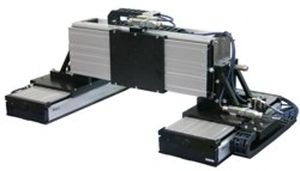Setting up parellel motors (two motors driving one gantry)
Servo tuning for parallel motors requires special attention as motors are not allowed to move freely without synchronism. However tuning the motors separately is usually still possible as gantry has some flexibility allowing one motor move just enough for tuning purposes.
Note on AC/BLDC/linear motors
Unlike DC motors, AC & BLDC & linear motors (synchronous motors) require alignment of magnetic angle/position to windings. This can be generally achieved by using one of the following methods:
- By driving current to windings and letting motor to settle to certain magnetic angle
- By utilizing absolute feedback device, such as Hall sensors or resolver, to give all needed information directly
Method 1 is not suitable with parallel axis as motor needs to be able to move in random direction a little but during drive power-up. The only option is to use absolute sensors which allows motor to stand still at power up. Typically Hall sensors are used in parallel motor configurations.
Tuning
After drives & motors are successfully powered and holding position, tuning is straightforward: tune one motor normally by use only very little amplitude of step response tests to prevent gantry flexing too much (to avoid damage). After one motor is tuned, the settings typically can be transferred 1:1 to the another motor.
It is highly recommended to do basic setup of motors with unconnected load (non mounted shaft). Basic setup includes setting motor parameters, torque tuning and, most importantly, testing motor's ability to stand still in position mode from the moment of power-up to entering into step response tuning.
In no event the Product Information or parts hereof shall be regarded as guarantee of conditions or characteristics. The Product Information or any part thereof may also not be regarded as a warranty of any kind. No liability of any kind shall be assumed by Author with respect to Product Information or any use made by you thereof, nor shall Author indemnify you against or be liable for any third party claims with respect to such information or any use thereof.
As content of this Wiki may be edited by user community, Granite Devices Oy or it's affiliates do not take any responsibility of the contents of this Wiki. Use information at your own risk. However, Granite Devices staff attempts to review all changes made to this Wiki and keep information trustworthy.
Without written consent, Granite Devices' Products or Intellectual Property shall not be used in situations or installations where living beings, material property, or immaterial property could be harmed by the operation, features or failures of Product. Products may only be used in a way where hazards like moving parts, electric shock, laser radiation, or fire can't be realized even if the content of this Wiki would suggest otherwise.
